home > articles > theology > The Big Words of Christianity

For I have given them the words that you gave me, and they have received them and have come to know in truth…
John 17:8
I have a son who thinks he is the world’s best speller. It’s actually become a family joke just how bad his spelling is though. In his 5th year of elementary school, he couldn’t see the irony of how he had labelled his Spelling Workbook – ‘Speeling.’ Even now, at pre-tertiary level, Tiger (my son) still struggles with spelling. I have to read and re-read what he has written in order to figure out which word he is actually trying to use.
So if you saw the mis-spelt word b a i r in your child’s schoolwork how would you determine what he or she meant? Did he/she mean bare or bear? If your child meant bear, which bear did they mean? After all, if they meant bare they could have meant: empty (the cupboard was bare), or: naked (bare shoulders sometimes need covering), or, they could mean: show (bare one’s teeth). But then, if they meant bear they could mean: an animal, or to turn (bear left), or to carry (bear a burden). The only way you could determine what your child means would be to read the context of what they had written. This is because words are generally equivocal- the context determines it’s meaning.
 Just understanding that words in the Bible are (generally) equivocal (they need be read in context), should help the Bible reader to insist on reading the Bible in books not bits. This simple principle should scold those unprofessional Bible teachers who promote contrary Bible interpretation methods such as the Law of First Reference (where it is thought that a Bible word is always defined by its first use in the Bible). It should also temper those who place too much credence on doing Word Studies as this method tends to divorce a Biblical word from its context.
Just understanding that words in the Bible are (generally) equivocal (they need be read in context), should help the Bible reader to insist on reading the Bible in books not bits. This simple principle should scold those unprofessional Bible teachers who promote contrary Bible interpretation methods such as the Law of First Reference (where it is thought that a Bible word is always defined by its first use in the Bible). It should also temper those who place too much credence on doing Word Studies as this method tends to divorce a Biblical word from its context.
CAN THE BIBLE BE UNDERSTOOD ‘SIMPLY’?
 No. While most of the Bible is simple to understand but difficult to live up to (for example, Philippians 2:14) Western Bible readers especially have to roll up their intellectual sleeves when attempting to understand the Bible. Today, we speak different languages to the Biblical authors. This presents translation challenges. We also now use different idioms, metaphors, currencies, measures and descriptions of time. This demands a little effort to understand what the Biblical writers meant. How many Bible readers know what a Biblical “talent” is, for example? It seems from many sermons on the ‘Parable of the Talents’ that talents is misunderstood for ‘ability’.
No. While most of the Bible is simple to understand but difficult to live up to (for example, Philippians 2:14) Western Bible readers especially have to roll up their intellectual sleeves when attempting to understand the Bible. Today, we speak different languages to the Biblical authors. This presents translation challenges. We also now use different idioms, metaphors, currencies, measures and descriptions of time. This demands a little effort to understand what the Biblical writers meant. How many Bible readers know what a Biblical “talent” is, for example? It seems from many sermons on the ‘Parable of the Talents’ that talents is misunderstood for ‘ability’.
|
When it comes to understanding the Bible, simple interpretations often end up becoming simplistic instead. A simplistic understanding of Scripture overlooks important facts which (often innocently) leads to a misunderstanding of the text.
The other thing that requires the Bible to be read with care is its usage of very precise big words. Unlike the general words of the Bible, which are equivocal, there are some very deliberate and selectively used words that are unequivocal. |
 |
THE BIBLE’S LITTLE BIG WORDS…
There are some big words in Scripture that actually look deceptively small. For example-
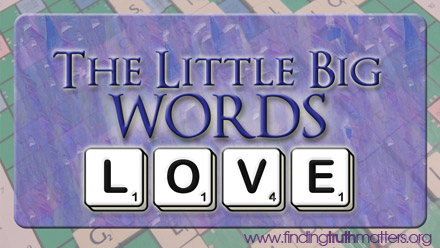 “Love” is perhaps the biggest word in the Bible. Yet there’s probably not a person on the planet who understands what the Bible means by this word. We live in a world where people “make” love when what they may actually mean is that they “fornicate”. When a man says to his wife that he would “love” to go shopping with her, what he actually may mean is that he doesn’t want her to spend too much. We use this word in ways that are quite foreign to the way the Bible uses this word. “Love”, as used in the Bible, is more akin to giving, caring, unconditional kindness, sacrificial serving, joyful delight in the presence of. Biblically the word love is either of three Greek words: agape (unconditional giving regardless of the response), phileo (brotherly love), or storgos (kindness toward another, Rom. 12:10). Therefore, this “big” word is not unequivocal. The Bible reader must consider the context to understand the way in which this word is being used.
“Love” is perhaps the biggest word in the Bible. Yet there’s probably not a person on the planet who understands what the Bible means by this word. We live in a world where people “make” love when what they may actually mean is that they “fornicate”. When a man says to his wife that he would “love” to go shopping with her, what he actually may mean is that he doesn’t want her to spend too much. We use this word in ways that are quite foreign to the way the Bible uses this word. “Love”, as used in the Bible, is more akin to giving, caring, unconditional kindness, sacrificial serving, joyful delight in the presence of. Biblically the word love is either of three Greek words: agape (unconditional giving regardless of the response), phileo (brotherly love), or storgos (kindness toward another, Rom. 12:10). Therefore, this “big” word is not unequivocal. The Bible reader must consider the context to understand the way in which this word is being used.
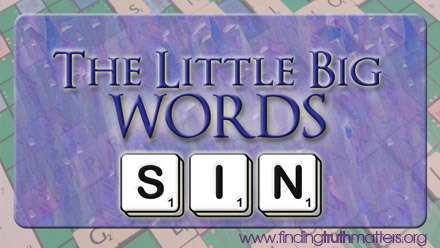 ‘Sin’ is a big word in the Bible. Sin was an archery term. If an arrow missed its intended target it was harmartia – ‘missing the mark’ – or in English: sin. This idea is carried over into our moral condition before an infinitely holy God. We all miss the mark of His target of moral and spiritual perfection. This apparently little word can damn a person’s soul for eternity if left unforgiven or un-atoned for.
‘Sin’ is a big word in the Bible. Sin was an archery term. If an arrow missed its intended target it was harmartia – ‘missing the mark’ – or in English: sin. This idea is carried over into our moral condition before an infinitely holy God. We all miss the mark of His target of moral and spiritual perfection. This apparently little word can damn a person’s soul for eternity if left unforgiven or un-atoned for.
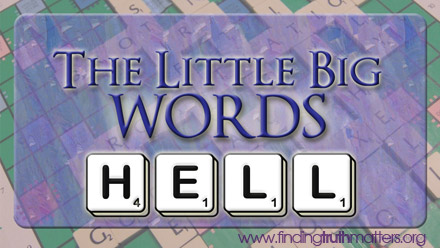 ‘Hell’ is a big word in Scripture. Some Bible teachers have sought to redefine Hell as something other than degrees of eternal torment by teaching what is called Annihilationism (the idea that God doesn’t eternally punish anyone, rather, He simply ends their existence). This is closely associated with another idea called Universalism (that all people are actually saved by virtue of Christ’s atonement). As Dr Tony Campolo said in his book, “Speaking My Mind”, that he warmed to the idea of there being no Hell, the only problem he had was that the Bible says there is!
‘Hell’ is a big word in Scripture. Some Bible teachers have sought to redefine Hell as something other than degrees of eternal torment by teaching what is called Annihilationism (the idea that God doesn’t eternally punish anyone, rather, He simply ends their existence). This is closely associated with another idea called Universalism (that all people are actually saved by virtue of Christ’s atonement). As Dr Tony Campolo said in his book, “Speaking My Mind”, that he warmed to the idea of there being no Hell, the only problem he had was that the Bible says there is!
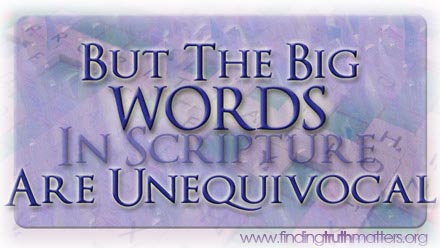
Every good English teacher will tell his students, “Don’t use a big word when a small word will do.” Similarly, they will teach their students to write concisely – don’t use a lot of words when you can say the same thing with just a few.* But sometimes it is a big word that is both simple and concise. This is especially so if the big word is unequivocal (it can only mean one thing). Scripture very carefully uses such big words. Let’s look at four of these and then we’ll conclude with Christianity’s biggest word.
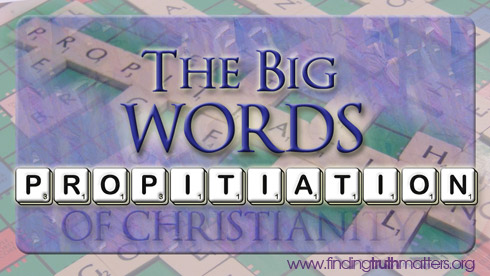 “Propitiation” is used just four times in the Bible.
“Propitiation” is used just four times in the Bible.
whom God put forward as a propitiation by his blood, to be received by faith. This was to show God’s righteousness, because in his divine forbearance he had passed over former sins.
Romans 3:25
He is the propitiation for our sins, and not for ours only but also for the sins of the whole world.
First John 2:2
To understand what this powerful word means, we need to first understand just how strongly God feels about sin and justice. Perhaps the word that most aptly sums up how God feels about sin and what level of justice is required to appropriately deal with sin is: wrath. Imagine being angry. Now imagine being really really angry about something you hate. How ever angry you can imagine getting, you are still only experiencing an infinitesimal amount of how angry God feels about, and how much He hates, injustice caused by sin. The closest word we have in English to describe this emotion is: wrath. Propitiation is God unleashing His fury and wrath upon someone so that His need for justice is satisfied and the guilty can receive mercy. This word does not occur in the Old Testament. Instead the Old Testament word is: atonement.
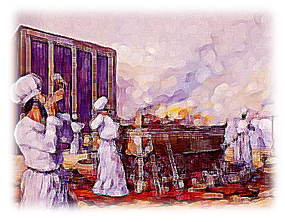
 The Old Testament pre-illustrates the truth of the New Testament. It dramatically portrays propitiation and atonement in a ritual ceremony called Yom Kippur. Described in Leviticus 16, on this most holy day, two goats were presented to the High Priest. Lots were cast for which goat would be made the sacrificial offering for the sins of the people. The goat not chosen to be sacrificed (by the short straw) then witnesses the High Priest lay his hands on the head of the doomed goat and pronounce the sins of the people be upon you. It then witnesses its fellow caprine have its throat slit.
The Old Testament pre-illustrates the truth of the New Testament. It dramatically portrays propitiation and atonement in a ritual ceremony called Yom Kippur. Described in Leviticus 16, on this most holy day, two goats were presented to the High Priest. Lots were cast for which goat would be made the sacrificial offering for the sins of the people. The goat not chosen to be sacrificed (by the short straw) then witnesses the High Priest lay his hands on the head of the doomed goat and pronounce the sins of the people be upon you. It then witnesses its fellow caprine have its throat slit.
 As the bloodied and slain goat was lifted onto the Brazen Altar, the blood-splattered-yet-living goat would be released to flee through the open gate into the wilderness. This is where the expression “Scape Goat” comes from.
As the bloodied and slain goat was lifted onto the Brazen Altar, the blood-splattered-yet-living goat would be released to flee through the open gate into the wilderness. This is where the expression “Scape Goat” comes from.
It is a picture of us on Judgment Day before God. We approach God’s Altar like the two goats being brought before the High Priest and have our sins read against us. Two things become immediately clear: (i) We are unjustifiably guilty; and (ii) God is furious about our guilt! But we are not standing before God alone. As God pronounces judgment against us, the One standing beside us steps in front of us to take our punishment and bear the wrath of God. The One standing beside us is Jesus Christ. He was the Yom Kippur Goat. We who have accepted Him as our propitiation are like the goat that is allowed to escape. And this Old Testament illustration serves to illustrate another big word of the Bible…
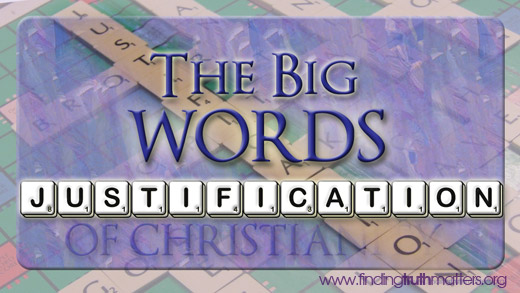
If you turned up to our appointment and I said to you, “Justify yourself!” I would be asking you to give a reason for your actions that could excuse your poor behaviour. To justify yourself is to give a good enough reason to be considered innocent. returning to our Yom Kippur illustration, if we were standing before God on Judgment Day and heard Him say “Justify yourself!” we would soon realise why the Scripture says “every mouth will be stopped”-
¶ Now we know that whatever the law says it speaks to those who are under the law, so that every mouth may be stopped, and the whole world may be held accountable to God.
Romans 3:19
In other words we won’t be able to answer God. But for those who have received Christ, they won’t have to answer because Christ will step in front of us and be our justification before God. What can we possibly say before God to justify ourselves? The only satisfactory answer is: Jesus.
And the free gift is not like the result of that one man’s sin. For the judgment following one trespass brought condemnation, but the free gift following many trespasses brought justification.
Romans 5:16
Not only is Christ our propitiation, but He is also our justification.
[Jesus] who was delivered up for our trespasses and raised for our justification.
Romans 4:25
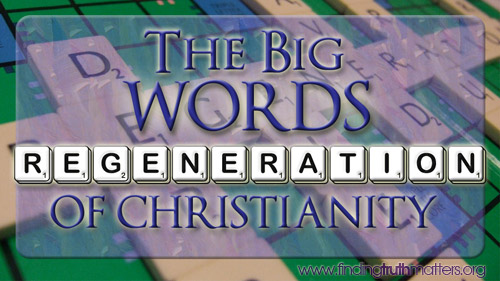
 ‘Regeneration’ is both a long and a big word in the Bible. It is one of the distinguishing hallmarks of Christianity. Without being spiritually regenerated you can not be a Christian. Jesus used this term in different words when He told Nicodemus that he be born-again (John 3:3). This is why becoming a Christian is not merely an intellectual exercise. Neither is it merely turning over a new leaf morally. The Bible teaches that regeneration is not the result of anything we do. It is entirely the work of the Holy Spirit gracing a spiritually dead person.
‘Regeneration’ is both a long and a big word in the Bible. It is one of the distinguishing hallmarks of Christianity. Without being spiritually regenerated you can not be a Christian. Jesus used this term in different words when He told Nicodemus that he be born-again (John 3:3). This is why becoming a Christian is not merely an intellectual exercise. Neither is it merely turning over a new leaf morally. The Bible teaches that regeneration is not the result of anything we do. It is entirely the work of the Holy Spirit gracing a spiritually dead person.
he saved us, not because of works done by us in righteousness, but according to his own mercy, by the washing of regeneration and renewal of the Holy Spirit,
Titus 3:5
In order to understand why people need regeneration, Paul the apostle explained to the Ephesians that all people are spiritually dead without Christ.
¶ And you were dead in the trespasses and sins
Ephesians 2:1
“Dead” in Biblical terms doesn’t mean cease to exist, rather it means “separated” (from a life source). To be spiritually dead is to be separated from God by sin.
But your iniquities have separated you from your God;
And your sins have hidden His face from you,
So that He will not hear.
Isaiah 59:2
When a person’s body is separated from their spirit, they are dead.
…the body apart from the spirit is dead…
James 2:26
To be spiritually regenerated by the Holy Spirit is to be reconciled to God through having our sins forgiven and a relationship of adoption established and a warmth of divine fellowship commenced through prayer. Have you been regenerated? It is what the New Testament calls our First Resurrection(Revelation 20:5) or as Paul puts it –
But God, being rich in mercy, because of the great love with which he loved us, even when we were dead in our trespasses, made us alive together with Christ—by grace you have been saved—
Ephesians 2:4-5
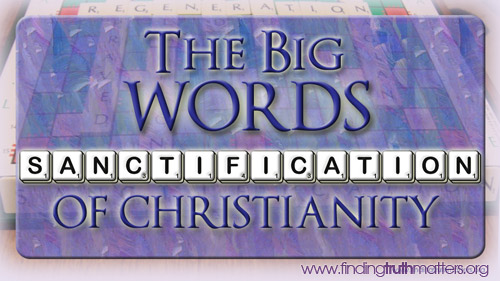
“Sanctification” is only used about six times in the New Testament. It means to purify. Most Christians use this word to talk about their Christian growth. In this sense, sanctification means to grow holier or spiritually purer.
But now that you have been set free from sin and have become slaves of God, the fruit you get leads to sanctification and its end, eternal life.
Romans 6:22
There is no doubt that we are to grow in this way. But this may not be the most accurate usage of this word in the New Testament. It seems that sanctification has two aspects. Firstly, there is its judicial aspect. In the eyes of God the reconciled, regenerated adopted child of God is sanctified (made holy) by virtue of Christ. This sense of sanctification is therefore a past event. The second sense of the word is the practical aspect. This sense of sanctification is therefore a present event.
For this is the will of God, your sanctification: that you abstain from sexual immorality;
First Thessalonians 4:3
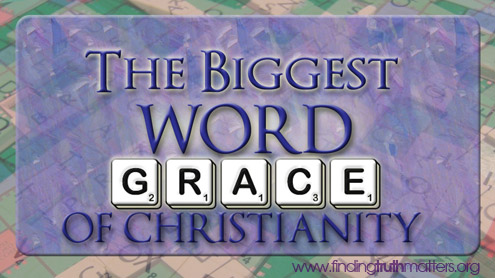
But the biggest word in Christianity is not propitiation, justification, regeneration, or even sanctification. The biggest word in Christianity is grace. Why would a God who demands our happiness and complete joy and that we be at peace with Him and others, be so furious when we replace true happiness for idolatry or peace with others for selfishness? This is partly because this is mutiny in the highest order. It is like saying to God, “You are inept at running the universe! You are the biggest loser in the cosmos! You do not deserve credit for anything! I know more than You. Don’t You dare make any rules for me to keep!#@! I want nothing to do with You -Your words – Your will – or Your ways!” From God’s perspective, this is the stance of the morally good, decent, civil, educated, caring and even religiously devout person who has chosen to ignore God and His offer of reconciliation. Spiritual deadness ranges from denying there is even a problem (this is called lying – 1John 1:10) to blatant indifference to the consequences of such choices (1Tim. 4:2 – speaking lies in hypocrisy, having their own conscience seared with a hot iron). No matter where a person is on this range of spiritual mutiny and treachery, they are completely unable to rectify their situation and find peace with God. But God has chosen to rescue His enemies. What great love! What great grace! This concept of God is unique to Christianity. This is why we can say that grace is the biggest word in Christianity. Have you received the grace of God? You don’t need to use big words in your prayerful petition to God for it.
© June 26th 2009, Dr. Andrew Corbett, writing from Legana, Australia
-
Sale!
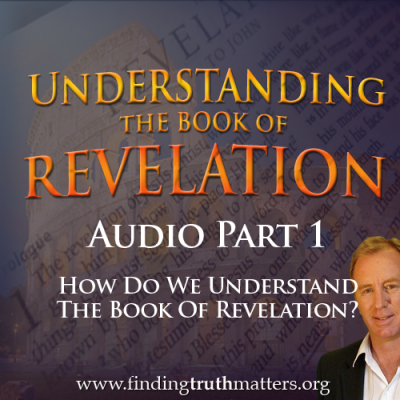
Understand The Book Of Revelation, Part 1 (Radio Edition)
Original price was: $1.25.$0.00Current price is: $0.00. -
Sale!
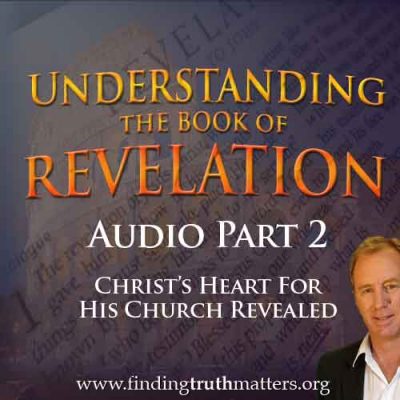
Understand The Book of Revelation, Part 2, Premium Audio Download
Original price was: $1.75.$1.25Current price is: $1.25. -
Sale!
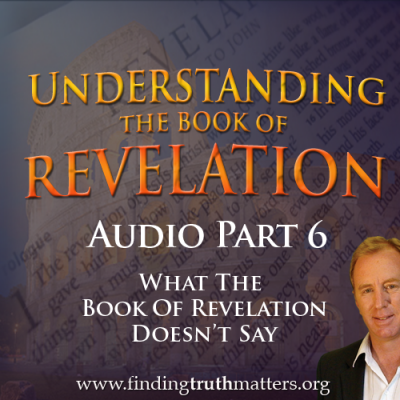
Understand The Book of Revelation, Part 6, Premium Audio Download
Original price was: $1.75.$1.25Current price is: $1.25. -
Sale!
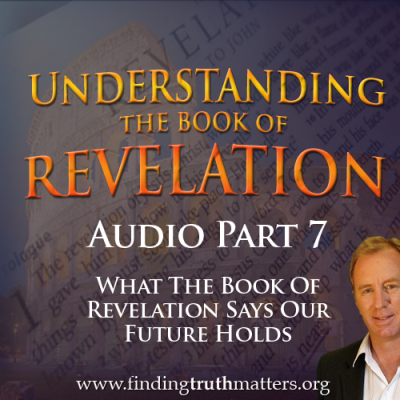
Understand The Book of Revelation, Part 7, Premium Audio Download
Original price was: $1.75.$1.25Current price is: $1.25.








































0 Comments